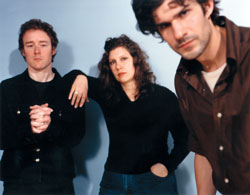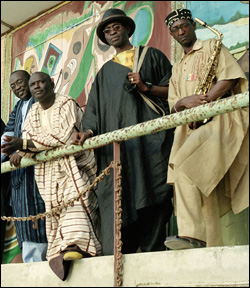When singer-drummer Mimi (pronounced “Mimmy”) Parker and singer-guitarist Alan Sparhawk met in the fourth grade, they were two farm kids sharing a classroom in the town of Clearbrook, Minn. (population: 600). They became sweethearts in high school, bonding over Hüsker Dü. In 1993, they formed the slow, minimalist pop trio Low in the slow, minimalist port town of Duluth, Minn., where they went to college together. Now married, they still live in Duluth, and longtime bassist (and comic book artist) Zak Sally makes the commute from Minneapolis to practice. In recent years, Low have toured with Radiohead, collaborated with Spring Heel Jack, and soundtracked a Gap commercial, finding an increasingly international audience along the way. But they remain engaged in the local scene, headlining the recent Green Man festival, where they played songs from their forthcoming eighth studio album against a backdrop of distant factory lights and the darkness of Lake Superior beyond. Last month, the band released A Lifetime of Temporary Relief: 10 Years of B-Sides & Rarities, a three-disc box set, on their own Chairkicker label. Sparkhawk and Parker have a daughter and a son: Hollis Mae, who is 4; and George Cyrus, who was born June 5 and goes by his middle name. (Sparhawk’s first name is also George; his alter ego in the Duluth blues-punk band the Black-Eyed Snakes is “Chicken Bone George.”) Both siblings were on hand for this jury, which took place on the evening of July 2 in the family’s dining room. The “Scott” mentioned here is Scott “Starfire” Lunt, a Duluth music activist and country singer who is also Low’s nanny.
Elvis Presley: “Blue Moon” (1954) from The King of Rock ‘n’ Roll: The Complete 50’s Masters (RCA)
Alan Sparhawk: Well, it’s not Elvis. It’s someone else.
Zak Sally: No, this is Elvis. Remember when I played you this? The guitar doesn’t sound like a guitar. It sounds like a Casiotone.
Mimi Parker: It doesn’t sound like Elvis, does it?
Sally: Listen to what he does here. [Elvis starts singing falsetto.]
Parker: Sounds more like Tiny Tim riding a horse.
Seattle Weekly: It’s from The Complete 50’s Masters.
Sally: I bought this after we read that two-volume [Peter] Guralnick thing. I read it, Scott [Lunt] read it. I thought it was one of the greatest biographies I’ve ever read in my life, and it made me love Elvis even more than I did before.
SW: Were you an Elvis fan before you read it?
Sally: I was an Elvis fan after the three of us went to Graceland.
Parker: I’ve always been an Elvis fan. You kind of can’t not be.
Sally: At first I thought this was Ennio Morricone.
Sparhawk: Or a Suicide bootleg. I’m serious.
Bo Diddley: “You Can’t Judge a Book by the Cover” (1962) from Bo’s Blues (Ace/MCA)
Sparhawk: His diction is too good to be Bo Diddley. Is it Bo Diddley?
SW: Yep.
Sparhawk: I’ll have to check this; I think it was on Ed Sullivan. But on one of those early TV variety shows, Bo Diddley was the first black performer. I’ve seen the footage, and it’s ridiculous. It’s just distorted as anything. It was before they’d really had a lot of experience with live bands on TV. And here’s a guy who comes on, and they were playing on the show like they do at gigs, which was just, like, “Turn it up.”
Sally: They had to get everyone to hear it.
Parker: Yeah.
Sparhawk: When they’d go in to record, they’d turn everything down. But when they would play gigs, it was just, like, crank that sucker up as loud as it’ll go. And it sounded like Sabbath. To this day, that was the best band ever on TV. Before they knew how to do it. It was amazing. Because his amps were just ripping, and he’s just screaming. And there’s that guy doing the maracas in a suit.
Beat Happening: “Other Side” (1989) from Black Candy (K)
Sparhawk: Beat Happening.
SW: I love how it slows down for a second.
Sally: For a second? [Everyone laughs.]
Sparhawk: [Beat Happening singer] Calvin [Johnson] played in Duluth the other week.
Sally: Calvin’s a genius.
SW: This seems like good kids’ music. Does Hollis like anything in particular?
Parker: Hollis likes pop songs.
Sparhawk: She likes edgy pop songs.
Sally: My goddaughter, when she was a little bit younger than Hollis, I decided, as a godfather, that we were going to have a song. I’d go over and we’d dance to it. And it was the one we were going to cover. “Mustang” from Black Candy.
Sparhawk: I was playing Photek or some drum and bass thing like that in the car. And I was like, “What do you think of this stuff, Hollis?” And she’s like, “Dad, I don’t like cool. I like beautiful.” That’ll be the title of our 20-year box set.
Parker: When I was going to buy her a jean jacket at Target, I said, “Here, Hollis, try this on.” “Nah, it’s too cool.” All right. You can’t argue with that. [Everyone sings along to the song.]
Sally: Sometimes I wish we had enough guts to just get up and do everything a cappella. Without any microphone or PA and all that.
Sparhawk: When Calvin played in Duluth, he played at this space, the Mac, or whatever. There were maybe 30 people there. He got up and did one song with the microphone, and it was just kind of small-club PA. And he was like, “Uh, this microphone thing is not really working out very well. So why don’t you just all come up onstage.” Everybody went up onstage and sat down. And he just stood in the corner with this acoustic guitar and did the show.
Sally: I love that.
SW: I saw him once in Minneapolis, and he came out into the audience with this acoustic guitar, walking down the aisle. There were a few of us who got there late, and I was just standing in the back. He came up to me, staring right at me, getting closer, like almost uncomfortably close. And then he turned away.
Sally: That should be the name of Calvin’s 10-year box set: Almost Uncomfortably Close. I told Al this story about when I was in Enemymine. I came in that one day, and Calvin was like, “I have a new name for your band. I think you should call it Pants.” And I smiled. And I was like, “Really, Calvin? You think we should call it Pants?” And he was like, “Yeah. Pants.”
The Jamaicans: “Ba Ba Boom” (1967) from Tougher Than Tough: The Story of Jamaican Music (Mango)
Sally: Is this Desmond Dekker?
SW: No. This is a stumper.
Sally: Toots?
SW: I honestly didn’t remember until I looked at the box. The thing about this song is that it reminds me a little of how Low seems to slow down without actually slowing down. It stretches out time.
Sparhawk: A lot of this music just feels very . . . sticky.
SW: Sticky and green.
Sally: Yeah, well, enough about that.
Hollis: [Joining the table] I want to hang around, too.
Sally: You want to hang around? Peter’s going to play a song, and you say if you like it or not.
Parker: And you guess what it is.
Hollis: I don’t know what it is, because I’m 4 years old.
Parker: Well, you know a lot for being 4.
Hollis: Um, OK.
Carole King: “Really Rosie” (1975) from Really Rosie (Ode/Epic/Legacy)
Hollis: I like this one, Mom.
Sparhawk: Holy crap. Somehow I remember this.
Sally: Back when she was with Gerry Goffin. She wrote “He Hit Me (and It Felt Like a Kiss),” because somebody was baby-sitting her and Goffin’s daughter, and they were friends of this baby-sitter. She was a teenager, and she came over with a black eye, and they said, “You’ve really got to get away from that guy.” And she said, “No, no, when he hit me, it felt like a kiss!” [The songs ends, and Hollis starts singing the melody, note for note.]
Parker: That’s impressive! It’s kind of ridiculous. I was listening to her sing along with Ben Kweller today in the car, and she gets every inflection.
Sparhawk: [To Cyrus, who has fallen asleep in his arms] What about you, barrel of monkey?
Parker: He’s going to be tone deaf.
Sparhawk: That’s OK, he’ll still play guitar.
Hüsker Dü: “One Step at a Time”/ “Pink Turns to Blue” (1984) from Zen Arcade (SST)
Sally: It’s from the ’80s. [Parker laughs.] I know this. It’s Hüsker Dü. This is a great song.
Parker: [to Hollis] What do you think about this song?
Hollis: Crazy! And I like it, too!
Sally: All right! This was a big record for me. And, I know, for many other people.
SW: [To Sparhawk] I was wondering whether this was the record you and Mim bonded over when you were in high school.
Sparhawk: No, [Hüsker Dü’s 1985] Flip Your Wig.
Parker: I don’t know why I got that.
Sparhawk: You went to Minneapolis and got three or four records.
Sally: [To Sparhawk] We used to cover something by them, didn’t we?
Sparhawk: We were going to do “Diane.”
Sally: We covered “Divide and Conquer,” but we did it country. And we did a thrash version of “Bela Lugosi’s Dead.”
Sparhawk: We were kids! [Laughs.]
Sally: When me and Al and Mim met, me and Al were in a band together for a while called 12:38.
Sparhawk: Do you see that time all the time, now? I see “12:38” all the time.
Sally: When [my girlfriend] Anne Googled my name, there was a picture of a clock company that came up. I’ve got it at home. One of the photos that came up under my name was a clock company with a digital clock that said 12:38.
Sparhawk: I’ll see 12:38 all the time. Like I’ll be going along driving or something, and I’ll have some realization or some moment of epiphany, and I’ll look up, and it’s 12:38.
Sally: The same thing happens to me. And you know what that proves? That’s a great name for a band.
Father Hennepin: “Girl of the North Country” (2000) from Duluth Does Dylan (Spinout)
Sparhawk: Is this Father Hennepin? It’s the Bob Dylan song with Johnny Cash.
Parker: [To Hollis] Who is it? Listen to that voice. Does it sound familiar to you?
Sparhawk: It’s your friend.
Sally: It’s your really good friend.
Hollis: Scott?
Parker: Yes, Scott [Lunt, aka the singer of Father Hennepin].
Sally: Somebody told us that Bob [Dylan] walked into this silkscreen place [in Duluth] and bought a bunch of shirts.
Sparhawk: Bob walked into this silkscreen place that Scott works at. And he bought a bunch of T-shirts that they’d done of this CD. Chris Monroe, this local artist, had done a series of Bob Dylan shirts. Like there’s one of him down at Positively Third Street Bakery, one of him down by the lighthouse. They’re pretty funny. But he came in and bought a bunch.
SW What was he doing here? Was he playing a show?
Parker: No, I think he’s got a place.
Sally: Shh! [Laughs.]
Parker: Yeah, he came in and apparently he looked like this homeless person; he had a hoodie on.
Sally: But everybody I’ve ever known that’s seen or met Bob Dylan says he kind of looks like a homeless person. I’m just affirming.
Parker: He bought a bunch of stuff with himself on it. Apparently Sam Shepard and Jessica Lange are around town, too.






